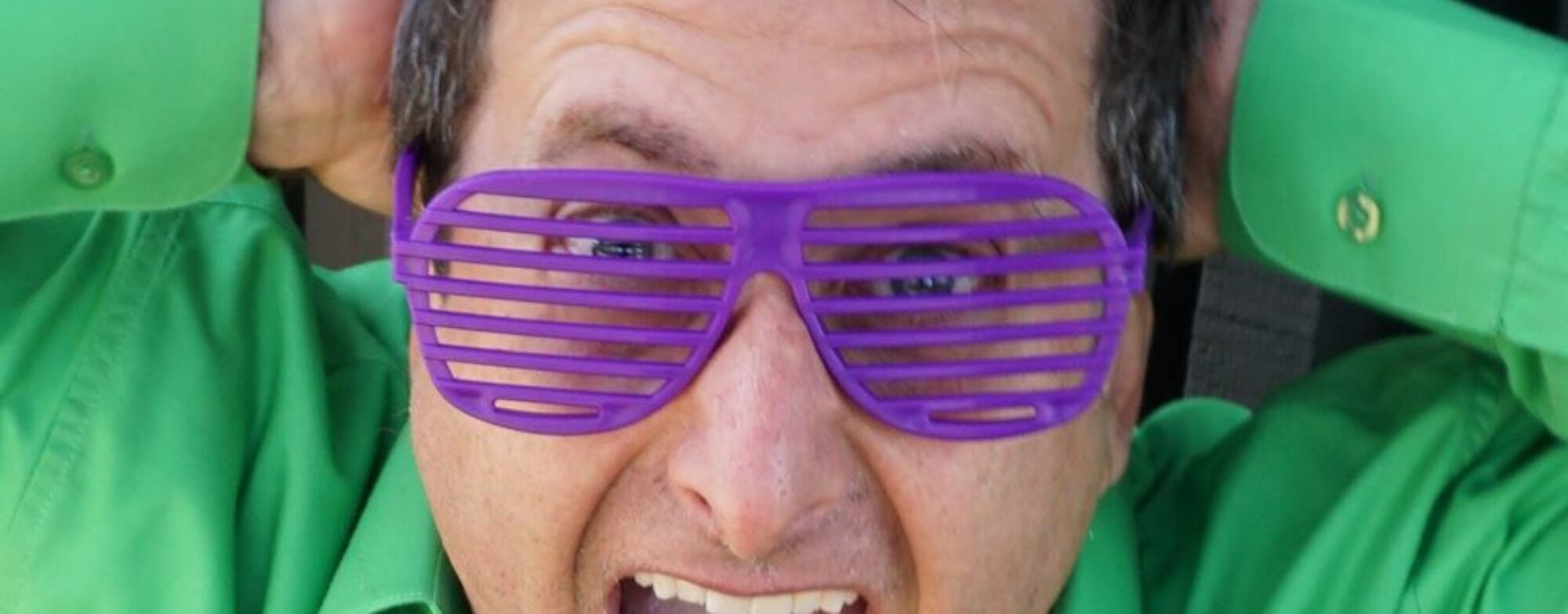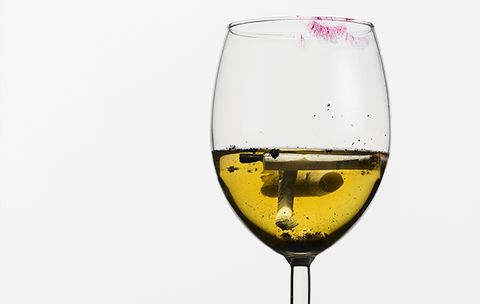By COREY LEVITAN
I have a serious drinking problem. I refuse to partake from my wife’s glass.
Like an otherwise normal person, I will swap spit during a kiss, since I am in love. However, imagine bottoming up an empty glass that your loved one has spit repeatedly into. Gross, right? That is exactly how I feel about doing the champagne switch toast.
I know that my phobia is not based on anything rational. I know that I won’t die from ingesting someone’s saliva particles. Yet there it is.
We’ve all got something similar, some bizarre little quirk that makes life a little more difficult. Oprah Winfrey is so revolted by gum-chewing, she bans it in her studio. Billy Bob Thornton can’t breathe around antique furniture. And it would probably be easier to compile a list of things that don’t freak out Woody Allen.
My editor at Men’s Health will not take a dump in a public bathroom. Ever. Better to crap his own pants than use an airport, airplane, or gas station restroom. It’s never come to that, but it totally would.
(Editor’s note: Yes, this is entirely true. No pants-crapping yet, but if it came to that… yes, I would make the hard choice.)
“We’re anxious about encountering things that we’ve either experienced in a traumatic fashion, or that we’ve heard about misfortune being associated with,” says anxiety disorder specialist Dr. Kevin Chapman. “These are things that have a low likelihood of danger. But when we’ve been emotionally conditioned and attach fear and anxiety to these objects or situations, they become a phobia. Even anticipating encountering that object or situation in the future creates so much distress, you learn to avoid it.”
Recently, I admitted my phobia to my younger sister, and she shocked me by immediately identifying its origins. And, like every other mental disorder Jews seem to suffer from, the answer is our mother.
When we were toddlers, our mother warned us how much sickness and death would result from this act of germ-spreading outlandishness. (I had totally blanked this out.) Now, my sister won’t share a glass with her spouse, either.
“I was just trying to prevent you from catching something from one of your friends,” my mother explained when I brought it up recently.
Gee, thanks, Mom. So here your children are, both complete grown-ups and not, ahem, sick at all.
How I found the one woman on earth crazy enough to put up with this craziness, I can’t say. But my wife pretends she doesn’t mind. In fact, recently I almost drank from her water glass by accident and she screamed “No!” as if saving me from actual danger.
Still, this is one strange and annoying fear I would like to lose. Like Dr. Chapman, my own shrink (and how much does it surprise you to learn that I have one?) is a fan of exposure therapy. She suggests that her patients confront their irrational fears by engaging in whatever behaviors trigger them.
“Let your brain learn that nothing bad will happen,” she says.
Before knowing about this therapy, I employed it myself by inventing a newspaper column in which I challenged my myriad other phobias on a weekly basis. And honestly, it did occasionally work. Ever since I volunteered to wash windows atop the outside of the Stratosphere in Las Vegas, and I didn’t fall to my death, I’m no longer as reluctant to stare out of high-rise windows.
A rabbi—who was kind enough to advise me during a recent quest to get my foreskin back—invited me to his house for Shabbat dinner. In Orthodox Judaism, the blessing of the wine is followed by a sacred ritual that could solve my problem.
Three days later, the rabbi hips the guests gathered in his living room to my phobia and the significance of what they are about to witness.
The rabbi sips from a blue and white ceramic cup of kosher chardonnay. He passes it to his wife on his left, who does the same.
All eyes follow the cup, as though it’s a Russian roulette gun. A Hassidic man visiting from Israel, wearing a foot-tall furry hat, stares tauntingly into my eyes and smiles as he brings the cup close to his beard-enshrouded mouth.
By the time it’s my turn, less than a third of the cup is left. I wince as I draw it near, then think about how happy I will be losing this stupid fear; how I will soon skip down city streets, grabbing half-finished drinks of God-knows-what off vacated restaurant tables while FaceTiming my mother and forcing her to watch.
On top of the Stratosphere, there was no direct access to the window-washing rig. Window-washers had to scale a 10-foot fence (the same one scaled by every distraught individual who committed suicide off the tower since it opened in 1996). On the other side of that fence awaited either a tiny landing platform, or a 1,000-foot drop.
This is just a glass of shared freaking wine. So why does it feel more difficult, more perilous and life-threatening somehow? It makes no sense!
“Get a good look,” my wife tells our four-year-old daughter, with whom I have never shared a glass either. “You’re never going to see this again.”
I wince and, like a dive into a freezing pool, it’s over. The wine, I notice, tastes like wine—not bad breath, cooties, or Ebola. The rabbi’s living room erupts in applause.
“Take another sip,” another guest says. “The second sip will count more.”
Which I realize is correct. So I do, to more applause.
The rabbi then takes the porcelain cup and pours the remainder into my regular wine glass.
Believe me, I would love to conclude by reporting how cured I am. But, after about 20 minutes, I sneak that glass into the kitchen and grab a clean one to continue drinking.
Oh, well. Baby steps.

